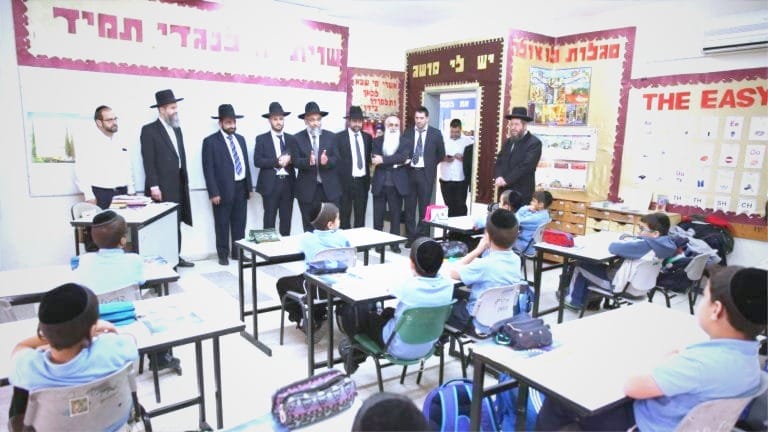What Is Maayan HaChinuch HaTorani and Why Was It Created?

Maayan HaChinuch HaTorani is a Charedi Sephardic school network in Eretz Yisrael, founded in 1984 by Maran Chacham Ovadia Yosef zt”l. Its mission was to rescue thousands of Sephardic children from spiritual decline and to provide them with an education rooted in Torah, halacha, and the mesorah of Sephardic Jewry—all while maintaining a warm, traditional environment.
Why Was There a Need for a Separate Sephardic School System?
In the decades following the founding of the State of Israel, Sephardic Jews who immigrated from Morocco, Iraq, Tunisia, Yemen, and other lands were often placed by the government into state-run schools, even if they came from deeply religious backgrounds.
These schools, especially in the Ma'abarot (transit camps) and development towns, frequently:
- Promoted secular Zionist ideology
- Had teachers unfamiliar or even hostile to Sephardic minhagim
- Offered limited limudei kodesh (Torah studies)
- Lacked rabbinic oversight or spiritual leadership
Many of these children lost their religious observance within one generation.
What Was Chacham Ovadia Yosef’s Vision for Maayan HaChinuch?
Chacham Ovadia Yosef envisioned a Torah school system that would:
- Restore pride in Sephardic mesorah and halachah
- Provide full-day Torah education guided by Gedolim
- Reach every level of society, from frum families to traditional homes
- Preserve Sephardic minhagim, piyutim, and tefillah styles
- Raise a generation of bnei Torah and future Talmidei Chachamim
He often said:
“We have no less right to our Torah than anyone else. Our children too must become Gedolim.”
How Did It Begin and Grow?
In 1984, shortly after the formation of the Shas party, Chacham Ovadia Yosef and Rav Shalom Cohen zt”l helped create Maayan HaChinuch HaTorani as its educational wing.
With initial funding and political support from the newly elected Shas representatives, the network quickly grew to include:
- Elementary schools (Talmudei Torah)
- High schools (Yeshivot Ketanot)
- Girls’ schools (Beit Yaakov-style)
- Preschools and kindergartens
Within just a few years, Maayan HaChinuch was educating tens of thousands of children across Israel.
Today, it operates in over 100 cities and towns, including Yerushalayim, Be’er Sheva, Elad, Netivot, Tzfat, and Ashdod.
Who Are Some of the Gedolim Behind Maayan HaChinuch HaTorani?
- Chacham Ovadia Yosef zt”l – Founder and spiritual leader
- Chacham Shalom Cohen zt”l – Longtime Rosh Yeshiva and spiritual head
- Chacham Moshe Maya shlit”a – Senior leader in the Shas party and Torah world
- Chacham Rafael Cohen – Former Chief Rabbi of Petach Tikvah, involved in oversight
- Chacham Dovid Yosef shlit”a – Active in policy and halachic supervision
How Has Maayan Resisted State Pressure to Compromise on Curriculum?
From its inception, Maayan HaChinuch HaTorani has stood firm against attempts by the Israeli Ministry of Education to impose core curriculum standards that would undermine Torah values.
While the State has often tied financial incentives or recognition to the teaching of secular subjects like advanced science, literature, or civics—Maayan’s leadership has consistently drawn red lines where such studies conflict with emunas chachamim, kedushah, or basic hashkafah.
For example:
- Civic studies promoting pluralism and alternative lifestyles have been flatly rejected.
- Literature with secular or inappropriate content has been replaced with Torah-aligned material.
- Tests or supervision by secular education officials are carefully vetted by rabbinic boards.
In certain cases, Maayan schools have foregone additional government funding rather than compromise halachic or hashkafic integrity.
As Chacham Shalom Cohen zt”l said at a gathering of educators:
“If the price of money is the soul of a child, we do not pay.”
This refusal to bow to outside ideological influence is one of the greatest testaments to Maayan’s success. It offers a full Torah education under rabbinic control—without betraying the values it was built to uphold.
What Is the Impact of Maayan HaChinuch HaTorani?
- Over 60,000 students enrolled today
- Thousands of Sephardic avreichim, Rabbanim, and dayanim trace their chinuch back to Maayan
- Outreach to traditional families who would otherwise be lost to secularism
- Raised Torah literacy and religious pride in dozens of towns previously neglected
- Created a national infrastructure of Sephardic chinuch under Daas Torah
A True Story: The Bus Driver’s Son
In 1990, in a town near Netivot, a simple Sephardic bus driver approached the local Maayan principal and said:
“I was raised frum, but I didn’t know how to give it over. My son was almost sent to a regular school. Now he’s in 4th grade here, and he learns Mishnayos better than I ever did. You’ve saved my family.”
That boy went on to become a Rosh Kollel in Ashkelon.
Sources and Footnotes
- Chacham Ovadia Yosef: His Life and Teachings, Vol. 3, pp. 217–232
- “Why Chacham Ovadia Founded a School System,” Yated Ne’eman (Hebrew edition), 2002
- “Educational Achievement in Charedi Schools,” Jerusalem Post, 2017
- Maayan HaChinuch HaTorani: 30 Years of Impact, internal publication, 2014
- Interview with Chacham Moshe Maya, Kol B’Ramah, March 2020
- Ministry of Education Report on Charedi School Networks, 2022
- “The Charedi Education Revolution,” Makor Rishon, Sept. 2023
- Speech by Chacham Shalom Cohen, Maayan Educators Conference, 2013
